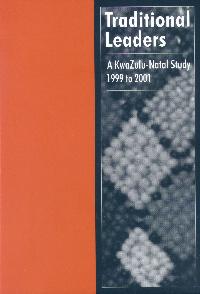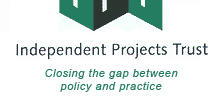
Independent Projects Trust
Publications
Traditional Leaders
A KwaZulu-Natal Study 1999 - 2001

Issues relating to the role and responsibilities of traditional leaders have received much attention since South Africa's first democratic government came to power in 1994, and particularly over the past two years as the country has held a general election and a local government election.
Uncertainty about the role of traditional leaders has contributed to tensions between government and traditional leaders. The ones who have suffered most are residents of rural communities who desperately need to benefit from local economic development. Instead these tensions have delayed development.
For this reason, the Independent Projects Trust, through funding from the Charles Stewart Mott Foundation, has conducted research to examine ways for both traditional leadership and local government structures to work together to improve lives in rural communities. One of the outcomes of this research is the publication of a book, a summary of which follows.
Summary
Issues relating to the role and responsibilities of traditional leaders have received much attention since South Africa's first democratic government came to power in 1994, and particularly over the past two years as the country has held a general election and a local government election. So much so that the local government election eventually held in December 2000 was delayed in an attempt to address the concerns of traditional leaders. While there is an idealised historical model of traditional authorities, the institution of traditional leaders does not remain static and has undergone significant changes. Nevertheless, it incorporates a way of life that is fundamental to African values and cultures and there is evidence that amakhosi are still influential, particularly in rural areas of KwaZulu-Natal.
The history of traditional authorities is useful in attempting to understand a role for the institution today. Many writers and researchers observe that the institution is essentially undemocratic but also point out that the nineteenth century was a period of great flux and change in African societies. The twentieth century saw the Black Administration Act, which gave the colonial and apartheid governments immense powers to appoint traditional leaders and to change their areas of jurisdiction. It is therefore difficult to talk about how these systems work in the present because they have been so distorted. These distortions continued and were magnified under apartheid rule through the Bantu Authorities Act, during which time traditional leaders became "paid servants" of the state which made it difficult for them to resist government policies.
Traditional leaders are recognised in South Africa's Constitution, although there are no roles and responsibilities clearly defined in this legislation. A discussion document on traditional leaders and a white paper on local government both produced by the government have also attempted to reach some clarity on the role of ubukhosi. An Act passed originally in the former KwaZulu self-governing territory legislated the role, functions and remuneration of traditional leaders in KwaZulu. It has been the subject of a constitutional court challenge and found to be not inconsistent with the national Constitution. It is therefore recognised in the province of KwaZulu-Natal, although certain amendments have been made in recent years. Attempts in KwaZulu-Natal to draft a provincial Constitution also stalled on the constitutionality of the role of traditional leaders.
Ambiguity as to the precise role that traditional leaders should play in local government resulted in the intense discussions and politicking around the issue in the run-up to the municipal election, which was held on December 5, 2000. This report provides details about this process in the form of a chronology that highlights events over a two-year period. As part of the process leading to these elections, local government was restructured and boundaries of councils were redrawn. The process was not without controversy and was resisted by many traditional leaders from the start. Traditional authorities complained that public hearings organised by the Municipal Demarcation Board were poorly advertised and that their submissions were ignored. The Board counters that some traditional leaders simply refused to discuss matters of demarcation until the question of functions and powers had been resolved.
However, such debates around demarcation and the legitimacy of traditional leaders may seem largely irrelevant in rural areas where many traditional leaders have been accepted, out of respect and sometimes out of fear, as the authority on issues of development. Local government is usually regarded as closest to the people and therefore most capable of negotiating development via representatives who are elected and accountable to the people. This usurps the role that many traditional leaders would see as theirs. As a result of these tensions and difficulties development, which is particularly vital in rural areas, often falters.
Development is often dependent on the personality and initiative of an individual leader in an area - whether that person is a traditional leader, chairperson of the development committee or a councillor. In the two areas where intensive research has been conducted as part of this study - Khula Village and Nzimakwe Traditional Authority - individuals who are not fiercely aligned to specific political parties spearhead development. There are also areas where individuals are connected with centres of power in various hierarchies and are able to access resources through these connections. Nevertheless, service delivery is ultimately dependent on the initiative of the individual.
A debate that is often linked to development issues, is concerned with a particularly sensitive matter for amakhosi: The issue of land. Many amakhosi consider the control of land to be a primary responsibility. Even if traditional leaders are unable to perform a number of other roles with which they are currently concerned, the allocation of land is a central responsibility that most amakhosi are determined to keep.
Another function that traditional leaders perform which is of significant importance is concerned with the operation of customary courts. Such courts are usually located next to or near the house of the local inkosi. The procedure followed by the courts is customary procedure, which is generally regarded as simple, informal and flexible. This has resulted in many considering customary courts to offer an ideal mechanism for dispute resolution that could be duplicated elsewhere. However, others argue that customary courts are conservative and not able to deliver justice in the modern world.
Another area where ubukhosi is considered by some to be conservative is concerned with issues relating to gender. Questions are raised about traditional leaders and gender, particularly in light of the Bill of Rights in the Constitution, which states that no one may be discriminated against on the basis of gender. The institution of traditional leadership is considered commonly to exclude women from decision-making positions and to limit their participation at traditional gatherings. This is viewed as being inconsistent with provisions of the Constitution. It needs to be noted though that inequality has more to do with rituals of power that reinforce subservience rather than being treated differently, particularly where women themselves claim to have chosen the roles they perform.
It is widely acknowledged that in order to keep pace with a changing environment institutions in South Africa need to achieve an internal shift in mindset to keep pace with the transformation process. It is also widely accepted that training and exposure to new ideas and thinking are critical if this shift is to take place. Such education and training needs to be seen as part of a culture of life-long learning, rather than a single workshop being the 'solution to a problem'.
Several organisations have been given funding to conduct training programmes with traditional leaders in KwaZulu-Natal and there is a pressing need for these to be evaluated. Traditional leaders also need to be part of the process in which criteria for future training are defined. Future training initiatives must also consist of modules that are designed according to the needs of the traditional leaders and their communities rather than the whim of the delivering organisation. Material should also be provided in the language of the participants to ensure that it can be understood. It is imperative that traditional authorities are consulted throughout the process of the formulation of training material. Solutions to the debate about the relationship between local government structures and traditional authorities need to be worked out on a very local level. They should involve individuals from both structures holding discussions to determine their respective roles and functions in an effort to develop co-operative and constructive relationships that support rural development. This clarity would also provide the basis for both mutual accountability and training needs assessments.
This solution will by no means be regarded as acceptable by a number of traditional leaders and is likely to be rejected by some municipal officials. However, pragmatic approaches to the delivery of development at a local government level in areas where traditional leaders perform an important function should inform day to day relationships so that rural communities are not impacted on while awaiting policy resolutions.
Conclusion and Recommendations
The institution of traditional leadership is a complex structure that consists of far more than the traditional leader. The functioning and role of the structure has changed in numerous ways. This has been in part as a result of legislation passed by the apartheid government, but also simply because communities and ways of life are constantly evolving. Nevertheless, ubukhosi continue to play a significant role in the life of South Africans even in a legal context. Legislation makes provision for national and provincial Houses of Traditional Leaders and ensures that traditional leaders are paid out of the government budget. Documents such as the white paper on local government makes mention of traditional leaders and a discussion document solely on traditional authorities has been compiled and made available to the public for comment. Traditional leaders are also recognized by the Constitution.
Some may argue that none of this documentation goes far enough in allowing traditional leaders to perform a role befitting the stature of amakhosi. The opposing argument is that elected leaders are far more accountable to the people. While this argument continues - and this research shows that it has dragged on for years - development is delayed in rural communities, particularly where tensions are evident at a local level between local government and traditional authorities. Residents of rural communities, who are the poorest South Africans, urgently need to have access to basic services such as water, electricity, health facilities and education institutions that cannot be delivered until these acute tensions have been resolved.
Rather than dwelling on the uncertainty, contradictions and ambiguities presented by the institutional, legal and policy context in which traditional authorities operate, solutions can be developed on a local level. Such solutions should involve traditional authorities and local government structures holding discussions to determine their respective roles and functions in order to develop co-operative and constructive relationships that support rural development. This clarity would also provide the basis for both mutual accountability and training needs assessments.
Of course, this solution will by no means be regarded as acceptable by a number of traditional leaders who are determined to ensure that they obtain greater representivity on municipalities, or more mention in the Constitution. Similarly, it is likely to be rejected by some municipal officials who argue that they are now in control and question why they should have to consult with representatives from traditional authorities. These debates are important in order to resolve the impasse at national policy and legislative levels. However, pragmatic approaches to the delivery of development at a local government level in areas where traditional leaders perform an important function should inform day to day relationships so that rural communities are not impacted on while awaiting policy resolutions. These resolutions may be a long time coming since the politicisation of the debate over the role of traditional authorities has made it very difficult for the issue to be resolved. At local level agreements might find practical solutions to political problems. These solutions may enable breakthroughs in a debate that has reached something of a stalemate, which includes national government being unlikely to change legislation significantly to meet the full demands of traditional leaders.
Rather than calling on government to define a role for traditional leaders, this role should be worked out by the community in conjunction with local government structures and traditional authorities. It is not only through government that development can take place. Traditional leaders need to carve out of a role for themselves. If they continue to wait backstage while the national debate rages on, they are likely to be left there.
Recommendations
Payment
Traditional authorities need to ensure that performance in a hereditary system can be monitored and evaluated and consideration needs to be given to the relationship between performance and payment.
Development
Individuals - whether traditional leaders, chairpersons of development committees or councillors - must take the lead in delivering services to rural communities because development is largely dependent on the personality and initiative of individuals in particular areas.
Relationships between traditional leaders and local government must be improved to prevent development from being blocked either by traditional leaders who find initiatives threatening and undermining or by councillors who fail to consult and work co-operating with traditional leaders.
Land
Training in land administration is necessary to ensure that amakhosi have sufficient knowledge to efficiently exercise choices available to them in this regard.
Customary Courts
Further research that focuses on the functioning of customary courts in KwaZulu-Natal is needed. This should include an assessment of the procedures followed in customary courts to determine the difficulties experienced and to examine issues relating to the traditional law in the context of the Constitution.
Consideration should be given to setting up a traditional courts' secretariat that would ensure the smooth running of traditional courts. The secretariat could supervise the courts, deal with complaints, channel reviews, oversee the budget and conditions of services of the courts and regulate and protect traditional courts.
Consideration should be given to the training and appointment of paralegals as a way of improving traditional courts. Their training could include customary law, the Bill of Rights and basic elements of procedure and evidence as well as writing summaries of evidence and judgements to be used in appeals or reviews. Similar assistance could be provided through the deployment of law students to rural areas to provide support and skills to customary courts.
Customary courts should be brought under the control of the Department of Justice and training officers appointed by the department should be deployed to customary courts to provide on the job training with regard to civil and criminal matters.
The long-term role of customary courts in South Africa needs to be considered in light of the possible establishment of dispute resolution or community courts to ensure that there is no duplication in the services provided to communities. Where use can be made of facilities already in place that should be a priority.
Gender
Processes to ensure gender equity in areas under the leadership of amakhosi need to be put in place, but these must be complemented by real changes in all parts of society.
Training
Training and educational opportunities must be made available to traditional leaders in order to build on the current capacity of amakhosi.
An evaluation of all training that has been conducted for traditional authorities in KwaZulu-Natal needs to be carried out urgently. This should consider the appropriateness of the training, its impact, how many traditional leaders attended courses and the content of the workshops.
Criteria for future training need to be defined. Amakhosi must be part of this process.
Future training initiatives must consist of modules that are designed according to the needs of traditional leaders and their communities and should be provided in the language of the participants.
Co-operative governance
All role-players must focus attention on resolving roles and responsibilities at a local level rather than waiting for policy and legal guidance from national government.
In developing solutions at a local level, traditional authorities and local government structures should hold discussions to determine their respective roles and functions. This should be part of a process to develop co-operative and constructive relationships that support rural development.
Intensive discussions should be followed by training that assists each structure to play a role in delivering to the local community. This role should be identified after consideration is given to the characteristics and strengths of both the municipal and traditional structures in a particular area.
The process of compiling integrated development plans should be used by local government structures as an opportunity to hold detailed discussions with traditional authorities as part of efforts to develop a culture of community participation.
By working out specific roles for themselves in particular areas, traditional authorities consisting of proactive, development oriented individuals will play an important role in communities by boosting the capacity of local government, in addition to performing cultural functions.
For further information regarding this research contact Glenda Caine, or to purchase the book "Traditional Leaders : A KwaZulu-Natal Study 1999 - 2001" (ISBN 0-620-28460-9) contact Adams Bookstore or you can download an unformatted pdf version here


